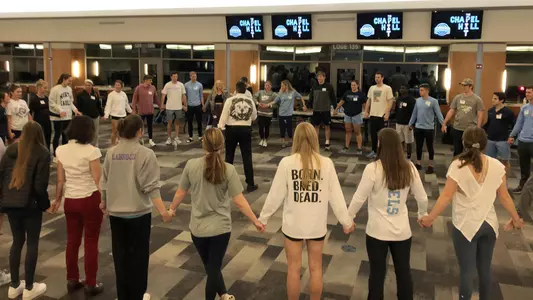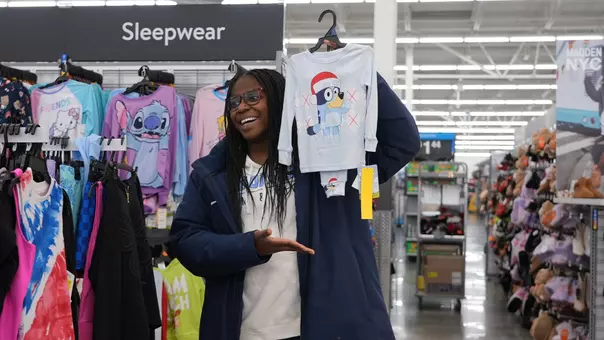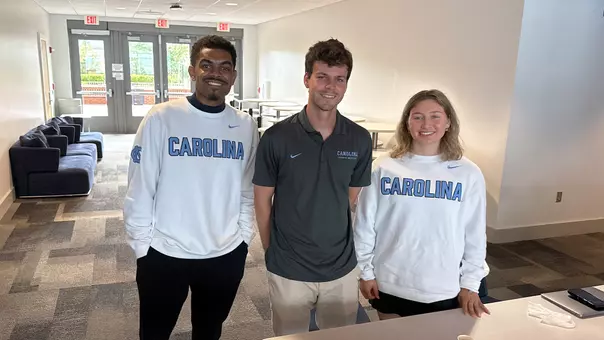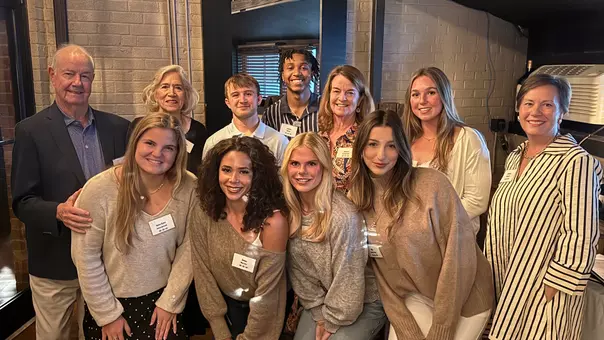University of North Carolina Athletics

Tar Heel student-athletes gather in a circle during a leadership exercise.
Tar Heel Leaders Learn From Improv Exercise
January 4, 2020 | Leadership Academy, Student-Athlete Development
By Natalie Ward
Athletes are expected to be leaders. The Richard A. Baddour Carolina Leadership Academy allows Carolina student-athletes to explore who they are as leaders, followers, and individuals. The phrase "Lead, Follow, or Get Out of the Way" implies that there is a time for a single individual to be a leader, a follower, and to get out of the way to enhance and take part in greatness. Allowing others to be successful or being successful through others is an essence within leadership that is not as prevalent when we think of leadership today. There is no perfect way to lead, or no perfect way to be successful.
On the evening of Oct. 21, nearly 50 Carolina student-athletes gathered for that month's Incubate workshop, in the third level of Leadership Academy programing. Waiting for them were representatives from a New York City-based improvisation group, People's Improv Theater, called "The PIT." Through a series of activities and games the UNC group was able to embark on a journey toward learning how listening, believing, and comedy all intertwine in the world of leadership.
To start the exercise, each participant walked across a stage, stopping to state their name, place of birth, and two of their hobbies. As the speaker finished, the audience repeated their name back to them. While it may seem goofy, hearing your name yelled back to you by 49 other people may not be natural for everyone, and it allowed every single person in the room to be acknowledged. The exercise was about owning your space for a moment and taking in the experience of owning that space. The leaders were reminded of one of the challenges of being a leader: "The hardest thing to do is be silent". It is very easy as leaders to speak and be heard, but it is very difficult to listen and understand. "Sometimes as a leader you get so caught up in recruiting everyone for the mission that you forget to relate on a personal level," said Jackie Williams, a member of the women's lacrosse team.
Student-athletes are no strangers to fear, failure, and competition. It is what they do with it that shows who they are as leaders. "Feel the fear and do it anyway," PIT founder Ali Farahnakian yelled across the large room as the groups were set up for rounds of a game called "Zip, Zap, Zop". The point of the game is to think on your feet and act as quickly as possible all while activating your own competitiveness. Throughout the evening, the Tar Heels heard: "Healthy competition is good, divisive competition is what holds you back." With that being said, it is also key to celebrate one another. As swimmer Emma Cole stated, "It's important to understand and be supportive of different challenges and victories that someone may have."
To close out the evening, Farahnakian asked for all the student-athletes present to make a large circle in the middle of the room. He asked everyone to take a moment and think of a phrase that started with "I Believe …" Participants could choose anything, but it had to be something they believed in and would say out loud to the group.
Some examples were:
"You have to break down before you break through."
"Ice cream always helps."
"Attitude affects others."
"Strive to be authentic."
"Practice does not make perfect, practice makes permanent."
All of these sentiments allowed the room to be vulnerable and honor the conversation taking place during that time. Prior to the activity, Farahnakian told the group, "Don't let your cleverness get in the way of your authenticity". It takes a leader to be authentic, and it takes authenticity for people to believe in a leader.
Following the "I believe" statements, the athletes were challenged to make a statement starting with "I am thankful for…"
Some of the answers were:
"Family"
"My support system"
"My health"
"My upbringing"
"The ability to play the game that I love"
Acknowledging what a leader is thankful for acknowledges that they cannot do everything alone, and there is something supporting them throughout being a leader. Whether you are the support system or you are the one leaning on a support system, listening to each other and collaborating is what makes a good leader capable of greatness.
As the saying goes, "Leaders are made in the locker room, not on the ice." It is about what they speak into existence, how they support their teammates, or how they listen to those who need to be heard that makes a good leader. It is not about what you do in a game, meet, tournament, or match that defines you as a leader. Thinking over this idea of leaders being made in the locker room, student-athletes stated specific goals and achievements beginning with "I will…"
Among these goals and achievements were things like:
"Be a 5th consecutive ACC Champion"
"Fold 1000 paper cranes"
"Get over a 510 on the MCAT"
"Raise my GPA by ¼ of a point"
"Break 16.40 in the 5K"
To end the night, every student-athlete stood in a circle, giving their undivided attention to each other as they made one last statement:
"I am somebody!"
As they spoke, they led. As they listened, they followed. And, as they stood there they got out of the way of the person speaking. Each person standing in that circle was able to take ownership of their statement, "I am somebody!" Over the course of the statement being repeated you could hear each person adding a different inflection, tone, or voice to the phrase. For each person who made that statement it meant something different internally, but to each person hearing the statement it meant something entirely different as well.
Natalie Ward is a UNC senior and a former member of the swimming & diving team.
Athletes are expected to be leaders. The Richard A. Baddour Carolina Leadership Academy allows Carolina student-athletes to explore who they are as leaders, followers, and individuals. The phrase "Lead, Follow, or Get Out of the Way" implies that there is a time for a single individual to be a leader, a follower, and to get out of the way to enhance and take part in greatness. Allowing others to be successful or being successful through others is an essence within leadership that is not as prevalent when we think of leadership today. There is no perfect way to lead, or no perfect way to be successful.
On the evening of Oct. 21, nearly 50 Carolina student-athletes gathered for that month's Incubate workshop, in the third level of Leadership Academy programing. Waiting for them were representatives from a New York City-based improvisation group, People's Improv Theater, called "The PIT." Through a series of activities and games the UNC group was able to embark on a journey toward learning how listening, believing, and comedy all intertwine in the world of leadership.
To start the exercise, each participant walked across a stage, stopping to state their name, place of birth, and two of their hobbies. As the speaker finished, the audience repeated their name back to them. While it may seem goofy, hearing your name yelled back to you by 49 other people may not be natural for everyone, and it allowed every single person in the room to be acknowledged. The exercise was about owning your space for a moment and taking in the experience of owning that space. The leaders were reminded of one of the challenges of being a leader: "The hardest thing to do is be silent". It is very easy as leaders to speak and be heard, but it is very difficult to listen and understand. "Sometimes as a leader you get so caught up in recruiting everyone for the mission that you forget to relate on a personal level," said Jackie Williams, a member of the women's lacrosse team.
Student-athletes are no strangers to fear, failure, and competition. It is what they do with it that shows who they are as leaders. "Feel the fear and do it anyway," PIT founder Ali Farahnakian yelled across the large room as the groups were set up for rounds of a game called "Zip, Zap, Zop". The point of the game is to think on your feet and act as quickly as possible all while activating your own competitiveness. Throughout the evening, the Tar Heels heard: "Healthy competition is good, divisive competition is what holds you back." With that being said, it is also key to celebrate one another. As swimmer Emma Cole stated, "It's important to understand and be supportive of different challenges and victories that someone may have."
To close out the evening, Farahnakian asked for all the student-athletes present to make a large circle in the middle of the room. He asked everyone to take a moment and think of a phrase that started with "I Believe …" Participants could choose anything, but it had to be something they believed in and would say out loud to the group.
Some examples were:
"You have to break down before you break through."
"Ice cream always helps."
"Attitude affects others."
"Strive to be authentic."
"Practice does not make perfect, practice makes permanent."
All of these sentiments allowed the room to be vulnerable and honor the conversation taking place during that time. Prior to the activity, Farahnakian told the group, "Don't let your cleverness get in the way of your authenticity". It takes a leader to be authentic, and it takes authenticity for people to believe in a leader.
Following the "I believe" statements, the athletes were challenged to make a statement starting with "I am thankful for…"
Some of the answers were:
"Family"
"My support system"
"My health"
"My upbringing"
"The ability to play the game that I love"
Acknowledging what a leader is thankful for acknowledges that they cannot do everything alone, and there is something supporting them throughout being a leader. Whether you are the support system or you are the one leaning on a support system, listening to each other and collaborating is what makes a good leader capable of greatness.
As the saying goes, "Leaders are made in the locker room, not on the ice." It is about what they speak into existence, how they support their teammates, or how they listen to those who need to be heard that makes a good leader. It is not about what you do in a game, meet, tournament, or match that defines you as a leader. Thinking over this idea of leaders being made in the locker room, student-athletes stated specific goals and achievements beginning with "I will…"
Among these goals and achievements were things like:
"Be a 5th consecutive ACC Champion"
"Fold 1000 paper cranes"
"Get over a 510 on the MCAT"
"Raise my GPA by ¼ of a point"
"Break 16.40 in the 5K"
To end the night, every student-athlete stood in a circle, giving their undivided attention to each other as they made one last statement:
"I am somebody!"
As they spoke, they led. As they listened, they followed. And, as they stood there they got out of the way of the person speaking. Each person standing in that circle was able to take ownership of their statement, "I am somebody!" Over the course of the statement being repeated you could hear each person adding a different inflection, tone, or voice to the phrase. For each person who made that statement it meant something different internally, but to each person hearing the statement it meant something entirely different as well.
Natalie Ward is a UNC senior and a former member of the swimming & diving team.
UNC Women's Basketball: Tar Heels Pick Up Win at Florida State, 82-55
Monday, January 19
WBB: Post-Florida State Press Conference - Jan. 18, 2026
Sunday, January 18
UNC Wrestling: #12 Carolina Controls Virginia, 25-10
Saturday, January 17
WBB: Post-Miami Press Conference - Jan. 15, 2026
Friday, January 16




